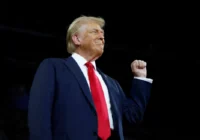The Export-Import Bank creates winners and losers, and Congress must balance its costs and benefits.
Suppose your aunt decides to start a business making pizza ovens. She will design and build the ovens, and her daughter will manage operations. A bank is ready to lend her $100,000 to get started, but it wants someone to co-sign and be on the hook if she misses any payments. She offers to pay you $6,000 to do so.
A business-savvy friend tells you that missed payments on such a loan average $2,000, usually less, occasionally much more. He also reports that $7,000 is the going rate for co-signing.
Those insights spark lively family debate. Your aunt believes her proposal is a no-brainer. She would get to start her business, your niece would get a better job, and you would come out $4,000 ahead on average. It’s a win-win-win for the family.
Your spouse disagrees. Yes you’d net $4,000, on average, but you would get $5,000 by co-signing a similar loan in the marketplace. Your aunt is asking you to bear the financial risk of her loan without fully compensating you. In a worst case scenario, you might end up owing the bank $100,000. You deserve to be fairly compensated for taking that risk. Co-signing would help her and your niece and may be best for the family. But the deal is not a win all around. You would be bearing real financial risk, effectively giving your aunt $1,000, and everyone in the family should acknowledge that.
Co-signing the loan would thus make you $4,000, according to your aunt, or cost you $1,000, according to your spouse. But which is it? And should you co-sign the loan?
Those questions are at center stage as Congress debates the fate of the Export-Import Bank, whose charter expires on September 30. The details are more complex — imagine the bank co-signing a loan to a restaurant in Ethiopia that wants to buy an oven from your aunt — but the issues are the same.
Suppose your aunt decides to start a business making pizza ovens. She will design and build the ovens, and her daughter will manage operations. A bank is ready to lend her $100,000 to get started, but it wants someone to co-sign and be on the hook if she misses any payments. She offers to pay you $6,000 to do so.
Like your aunt, bank proponents argue that guaranteeing loans is a win-win-win. American exporters will sell more abroad, a win for shareholders and a win for their workers. Bank fees more than cover expected losses, so taxpayers win as well. Indeed, the Congressional Budget Office (CBO) estimates the bank will net $14 billion from new guarantees over the next decade.
Like your spouse, however, others reject the idea that the bank is really a win for taxpayers. While it might generate $14 billion over the next decade, the bank would gain even more — $16 billion — if taxpayers were fairly compensated for the risks they would be taking. By offering loan guarantees at below-market rates, the bank will effectively lose $2 billion over the next decade, again according to CBO.
Your view of the bank’s profitability thus depends on what you measure it against. Official budget accounting, which shows the gain, compares the bank’s performance to a scenario in which it doesn’t exist. The CBO’s alternative, which shows the loss, compares the bank’s performance to a scenario in which it does exist but charges fair market rates.
Both comparisons are important. The $14 billion represents the expected fiscal gain if the bank is reauthorized for another decade, while the $2 billion represents the subsidy that exporters get from taxpayers who aren’t fully compensated for bearing new financial risks. The bank’s specific activities are costing taxpayers, but in purely monetary terms that is more than offset by the gains from being a commercial lender.
If the bank’s purpose were solely to make money, we’d do better to replace it with a commercial venture that operates on market terms. But making money is not the bank’s mission. Instead, its goal is to support American exporters, particularly in competition with foreign firms that also receive government backing.
Policymakers thus confront the same tradeoffs that arise for almost any policy. The bank creates winners and losers. Just as you need to balance the personal cost of co-signing your aunt’s loan at below-market rates against the potential benefits to your family, so must Congress balance the costs and benefits of the Export-Import Bank. It might still be worthwhile, but it’s not a win-win-win.
*[This article was originally published on Donald Marron’s blog.]
The views expressed in this article are the author’s own and do not necessarily reflect Fair Observer’s editorial policy.
Support Fair Observer
We rely on your support for our independence, diversity and quality.
For more than 10 years, Fair Observer has been free, fair and independent. No billionaire owns us, no advertisers control us. We are a reader-supported nonprofit. Unlike many other publications, we keep our content free for readers regardless of where they live or whether they can afford to pay. We have no paywalls and no ads.
In the post-truth era of fake news, echo chambers and filter bubbles, we publish a plurality of perspectives from around the world. Anyone can publish with us, but everyone goes through a rigorous editorial process. So, you get fact-checked, well-reasoned content instead of noise.
We publish 2,500+ voices from 90+ countries. We also conduct education and training programs
on subjects ranging from digital media and journalism to writing and critical thinking. This
doesn’t come cheap. Servers, editors, trainers and web developers cost
money.
Please consider supporting us on a regular basis as a recurring donor or a
sustaining member.
Will you support FO’s journalism?
We rely on your support for our independence, diversity and quality.







Comment